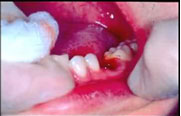Tooth or dental extraction refers to exodontia, a procedure defined as removal of a tooth from the dental arch. This measure is carried out when a tooth is deemed not salvageable or if it is associated with a pathology.
 |
 |
|
Tooth Extraction
|
|
Reasons for dental extraction
- Severe decay or caries
- Severe gum disease (periodontal disease) associated with tooth loosening
- Pathology associated (if the tooth is in close proximity or associated with cyst, tumours or jawbone fracture)
- Impaction associated with recurrent infection or potential damage to adjacent teeth
- Pulpitis (inflammation of tissue within the tooth)
- As part of orthodontic treatment
- Fractured tooth
- When retained (primary or ‘baby’ teeth)
What dental extraction procedure involves
When your dental practitioners has been consented to perform tooth extraction, you would be given local anaesthesia in the vicinity of the tooth to be extracted. Once you have been anaesthetized, the extraction involves using special instruments (elevators, forceps) in facilitating the removal of the tooth. You should not be feeling any sense of pain during the procedure, apart from the sensation of pressure,strecthing or pulling.
What should you do before an extraction?
-
- Before going to the clinic :
- Take your meal.
- Take your medications if you are on any e.g. for heart disease, diabetes
- If you have a medical card or a list of medications you are taking, please bring it along with you when you see your dentist
- Bring along any related (head and neck) radiographs (x-ray films), if you do have any
- Before going to the clinic :
- During treatment :
- Inform the dentist if you have any medical problem.Inform the dentist if you have any medical problems, if you are taking any medications, or if you have had any previous difficult extractions before
- Notify your dentist if you’re anxious or feeling unwell
What should you do after an extraction?
-
- DO’s
- Place and bite gauze properly over the site of extraction for at least ten minutes or until the bleeding stops.If bleeding continues, bite on clean gauze and seek treatment at the nearest dental clinic or hospital immediately.
- Swallow your saliva.
- Take the medication as instructed (eg painkillers or other medications for heart disease etc)
- DO’s
- DON’Ts
- Do not rinse your mouth within 24 hours.
- Do not disturb the extraction site with your tongue or finger.
- Avoid hot drinks or foods.
- Avoid strenuous exercise.
- Avoid smoking.
Can complications occur?
Normally the extraction socket will heal within 3-7 days, however complications may occur such as :
- Persistent pain.
- Swelling around extraction site
- Prolonged numbness
- Prolonged bleeding or recurrence of bleeding
- Socket not healing
- Infection
- Limited mouth opening
Consult your dentist immediately if you have any complications.
| Last reviewed | : | 7 January 2013 |
| Writer | : | Dr. Azillah bt. Mohd Ali |
| Dr. Che Noor Aini bt. Che Omar | ||
| Dr. Chew Yoke Yuen | ||
| Dr. Norrizan bt. Basir | ||
| Dr. Doreyat b. Jemun | ||
| Dr. Sharol Lail b. Sujak | ||
| Reviewer | : | Dr. Sathesh Balasundram |







